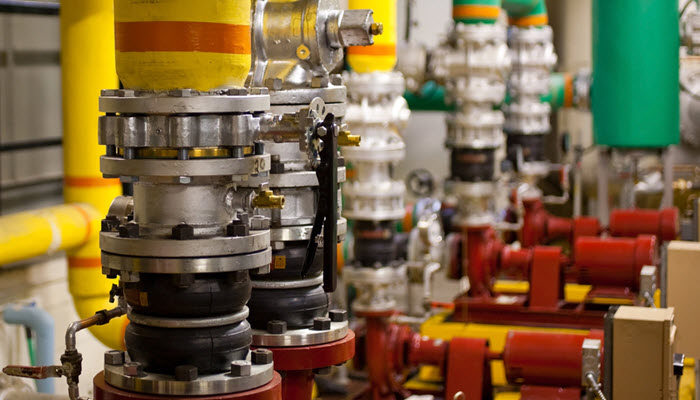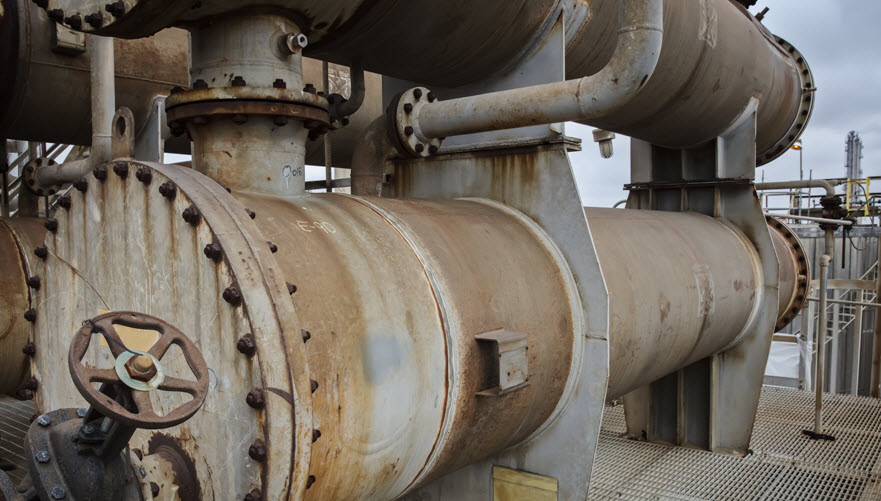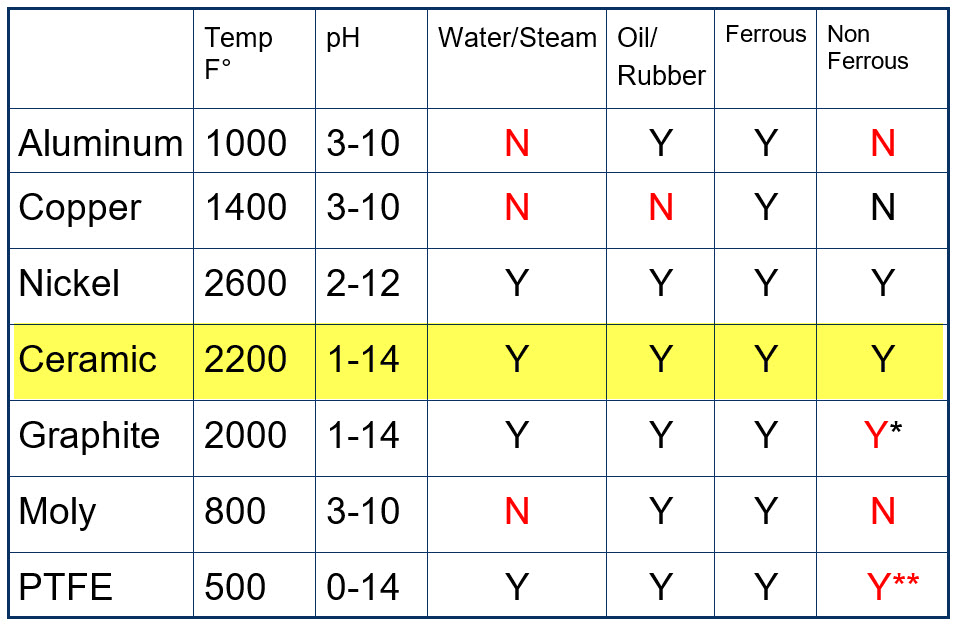
A thread lubricant, as with any lubrication product, is necessary to protect contact surfaces from wear and fatigue due to load and friction. Thread pastes assist in assembly to manage the friction between contact surfaces of thread, washer and nut face during the tightening of the assembly. This step is critical to have predictable bolt tension and to prevent thread fatigue, galling, and corrosion.
It is almost by second nature that maintenance, operation, and reliability engineers use some form of thread lubricant / anti seize when assembling bolted components. However, when you use the wrong thread paste, it can cause bolt failure leading to unanticipated costs and downtime. Valve, flange leakage, and other pressure vessel failures require shutdown and repair. Seizure during equipment disassembly extends tear-down time and delays planned outage work.
The Benefits of Non-Metallic Alternatives
Metallic anti-seizes based on nickel, aluminum, copper and lead have been the mainstay of thread lubrication since the late 1900s. This was functionally due to a focus on thermal limit, hardness of the metal, and chemical compatibility. Little attention was paid to personal health, environmental safety, and equipment compatibility. More recently, virtually all global health agencies and corporate leaders have promoted the use of environmentally-safer non-metallic alternatives.
Let’s review several reasons why that is:
1. Heavy Metal Pollution & Worker Safety
Over the past few decades, the use of nickel in industrial settings has been scrutinized for potential to cause lung cancer and blood-born ailments as it is a toxic heavy metal. This scrutiny also includes metallic zinc, copper, lead, antimony, and other heavy metals which may be considered environmental hazards. Many of the anti-seize lubricants that industry uses today contain these common ingredients.
Legislation enacted by the governments of the EU, USA, Australia, and New Zealand increasingly requires industries to act responsibly and use alternate technologies to reduce the release of heavy metals into the environment. The release of heavy metals into the environment where contamination of soil and water supplies can occur is a growing concern for all types of industry. Moreover, workers who inhale heavy metal powders during equipment disassembly (involving cleaning treated surfaces with wire brushing, rotary grinders, and scrapers) may face significant health risks.
2. Contamination of Machinery and Processes
Copper is recognized as a powerful “pro-oxidant.” The contamination of lube oil with copper anti-seize during the assembly of gear boxes, bearing housings, and hydraulic systems creates a situation that may compromise machine performance due to lube oil breakdown acerbated by copper contamination.
Furthermore, copper is a potential contaminant to chemical and polymer processing in that copper can react with and prevent catalysts from functioning in certain petrochemical processes such as rubber vulcanization and polymer cross linking.
3. Corrosion
The use of metallic-based thread paste technology can create conditions where the thread paste is incompatible with the metallurgy of the machinery. Metallic-based thread pastes typically contain a high percent volume concentration of graphite compared to the metallic filler. Graphite is often referred to as a “metalloid” in that it is conductive and acts as a dissimilar metal.
Stainless steel, carbon steel, brass, bronze, aluminum components being assembled require a thread lubricant that does not contribute to galvanic corrosion and, more so, protect the surface from atmospheric corrosion. When incorrect metal-based anti-seize lubricants are used on machinery, it can cause corrosion, unnecessary shut down and lengthy tear down times. Equipment availability and reliability become compromised.
4. Reliance on International Source of Supply and Supply Chain Interruptions
Primary metals such as nickel, copper, aluminum may be price sensitive due to worldwide economic demands caused by other industrial concerns buying up sizable quantities of raw materials. Further, when raw materials are sourced from an international location that is subject to internal and external political conflicts, their availability, regardless of price, may be disrupted. The resolution is to work with raw materials that are locally sourced, readily available and have minimal price fluctuation over a 5-10 year time frame.

5. Universal Performance Across Applications
Metallic-based anti-seize/thread lubricants have performance limitations due to the service condition and environmental exposure. Many metals are reactive to plant service conditions and bolting metallurgy.
As seen in the chart below, ceramic/inorganic based thread lubricants have fewer application limitations and are equally sound in replacing nickel-based thread lubricants.

This chart might also sheds light on the potential limitations of secondary fillers such as Graphite, Moly and PTFE, each of which has its own issues:
- Graphite, a known initiator of galvanic corrosion
- Molybdenum DiSulfide, dissociation of sulfur under heat or steam can initiate stress corrosion in some Cr-Ni alloy
- PTFE above 550°F (260°C) will decompose and liberate toxic fluorine by products which when inhaled, cause “polymer fume fever.” Polymer fume fever symptoms typically present several hours after initial exposure to polyisofluorobutylene, the toxic by-product of heat-decomposed PTFE. Workers who hold and smoke cigarettes when their hands have been exposed to PTFE have been shown to be at high risk of inhaling pyrolyzed PTFE
6. Global Responsibility and a Commitment to Safer Technologies
A.W. Chesterton Company has long been leading the technological change to non-metallic anti-seizes. In 1990, the company introduced its 785 Parting Lubricant, and more recently 783 ACR. Chesterton 783 ACR is a thread paste featuring water and corrosion resistance as well as extreme pressure protection that is 200 – 300% better than industrial standards tested on nickel, copper, and aluminum technologies.
Chesterton’s food-grade 785FG Parting Lubricant is a metal-free anti-seize which is beneficial to the food and beverage industry. It is uniquely formulated to comply with NSF H1 standards and conforms to 21 CFR for use in incidental contact areas. 785FG, unlike other food-grade thread pastes, can be used on all metal and temperatures up to 2200°F. 785FG does not contain any low melting point plastics or polymers such as PTFE, or HDPE, which limit operating temperatures to < 500°F (< 260°C).
These anti-seizes were formulated to be a universal replacement for metal-based thread pastes and sealants. Their design features a synergistic blend of primary and secondary micronized ceramic additives dispersed in a grease base. The resultant technologies are load and wear resistant, water resistant, and suitable for use on all metal types.
Chesterton’s metal-free anti-seizes show that you can meet both safety and environmental concerns in thread lubrication and have a high-performing lubricant.
